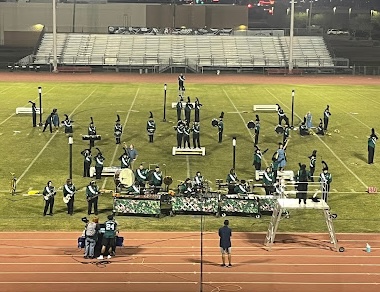Concept of fairness lacking in NFL Overtime rules
Christopher Jones
Mesa Legend
 Thinking back to the 2015 NFC Divisional playoff game between the Arizona Cardinals and the Green Bay Packers that included a hail mary and a three play overtime thrilling drive that resulted in a 26-20 OT win for the Cardinals in Glendale, Arizona would give even the most casual fans chills as it stands to be a game for the ages. To think that the victor of that match would be subjected to a tie resulting from different overtime rules that apply to the regular season.
Thinking back to the 2015 NFC Divisional playoff game between the Arizona Cardinals and the Green Bay Packers that included a hail mary and a three play overtime thrilling drive that resulted in a 26-20 OT win for the Cardinals in Glendale, Arizona would give even the most casual fans chills as it stands to be a game for the ages. To think that the victor of that match would be subjected to a tie resulting from different overtime rules that apply to the regular season.
Rules that are very different from those that are in place during the playoffs would leave casual and hardcore fans of the NFL perplexed. Yet, that is what happened on the Sunday night of October 23, also in Glendale, against the Carolina Panthers that ended in a grueling 6-6 tie. A quick review of the NFL’s overtime rules: According to the NFL official rules the playoffs overtime works as a modified sudden death. The rule states ‘each team gets a chance to possess the ball unless the team that receives the opening kickoff scores a touchdown on the initial possession.’
During the regular season, the rules are that each team will receive two timeouts, and will each get one possession to score unless a touchdown or a safety is scored on their first drives. If no team scores on their first drives it ends in a tie. If both fail to score on the following consecutive drives with the score tied the game ends as for how the game ended between Carolina and Cincinnati in week 6 of 2014. Understanding that in a 16 game season the difference between the two rules might prove to unfairly lead to outcomes taking place that if the other rule had been applied the opposite could have easily happened.
This is a competitive league. A plus one in losses or plus one and wins can determine the rest of the season, and even who ends up winning it all in the end. The problem with the rules is the coin toss. The league puts a lot of weight on who wins the coin toss by giving them the ability to score a touchdown to end the game. The coin toss should never have that much power and Green Bay should have been given the opportunity to complete a drive of their own and the quickness in which Arizona scored on a drive that lasted three plays it only compounded the suddenness that the game was over just like that.
Because a tie is rare for the sake of commonality among records to keep everything as simple as possible the NFL should not allow ties and a winner will be determined in that game. As the rule stands now, if two teams in the same division perhaps were to tie and had the same record at the end of the regular season we would have to play a tiebreaker anyway to determine a winner. Although this situation is even rarer, it would be an unnecessary effect of having ties when this could have been resolved during the first game.
Download UC Browser for Windows now from Softonic: 100% safe and virus free. More than 189893 downloads this month. UC Browser for pc speed beyond your imagenation. Enjoy The fast download experience on UC Browser.Best Free Download PC UC Browser on UC Browser
In the interest of the league’s integrity that top official implement a set of overtime rules that apply to both regular season and playoff games. Doing so would avoid confusion of everyone involved, most importantly the fans, players, and coaches involved. All while keeping the game simple ensuring that whatever opportunity one team is granted the other is as well to make a conscious effort to be fair.
The league’s best chance to provide a fair, balanced game that will still produce a victor is to have both teams possess the ball back to back until one reaches a lead and stops the opposing team, or a timed clock that will allow the teams to go back and forth until time is out. If the game is still tied a second overtime may be provided, or to add a twist to the sport introduce the team’s field goal kickers to kick a set amount of field goals and the one with the most would win. Similar to the way that a penalty kick would happen in soccer.









